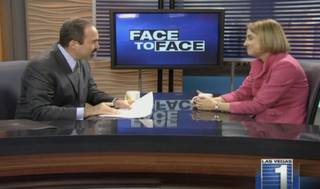Saturday, Feb. 21, 2009 | 2 a.m.
Face to Face: Taking its Lumps?

Viewing video requires the latest version of Adobe's Flash Player
Sun Archives
Add state coffers to the list of victims of Wall Street’s decline.
The state faces a $50 million loss on an investment with Lehman Bros., the Wall Street bank that failed last year, according to a confidential memo from Treasurer Kate Marshall obtained by the Las Vegas Sun.
The investment is set to mature on March 23, but Marshall acknowledged in an interview that because of Lehman’s bankruptcy, the state could lose its entire outlay.
Marshall, a Democrat, said she heeded advice from Wachovia, which had a contract to invest some of the state’s $3.6 billion portfolio. The company advised her not to withdraw the money from Lehman despite signs that the investment bank was about to fail.
Two days before Lehman filed for bankruptcy protection, Marshall’s office contacted Wachovia about pulling out, she said. “They said Lehman would make good, 100 cents on the dollar,” Marshall said. “We totally relied on Wachovia for their advice.”
Legislative leaders expressed concerns about the potential $50 million loss.
“There’s another $50 million hole in this budget process,” said Senate Minority Leader Bill Raggio, R-Reno. “My question is: Was it responsible to rely on the opinion of Wachovia or should there have been more oversight?”
Assembly Minority Leader Heidi Gansert, R-Reno, said, “ultimately, the treasurer is responsible to make investment decisions, even given outside advice.”
Speaker Barbara Buckley and Senate Majority Leader Steven Horsford, both D-Las Vegas, expressed concerns about the missing money, but said they have confidence in Marshall. “No one foresaw a crisis like this,” Buckley said.
Marshall said since the economic downturn began, she has pulled some investments at a loss to minimize the risk to taxpayers. Among them was an investment in insurance giant AIG.
“People should understand that the volatility in the market has led to exposure for everyone,” Marshall said. “I can’t get rid of risk. I can make sure it’s mitigated, it’s pulled back.”
The state changed the way it invests beginning in late 2007, when the financial markets began to seem unsettled, Marshall said. Since December 2007, the state has stopped entering new securities-lending investments, which had earned the state $12 million since the practice began in 1996, according to Marshall’s memo.
Securities lending allows the state, which is prohibited from directly purchasing stock, to purchase such items as U.S. treasury bonds and invest them with a Wall Street bank. The investment bank promises a specific return. In the case of the Lehman deal, Nevada was promised 102 percent of its investment after two years.
The state has $75 million in a similar investment with Wells Fargo, Marshall said. The state expects to be repaid in August.
Marshall said her office has also become more conservative with its investments.
Last fiscal year, Marshall said the treasurer’s office returned $55 million in interest to the general fund. This fiscal year, it expects to return $19 million, excluding the potential $50 million loss from Lehman.
The Lehman loss would be the first loss from securities lending in the state’s history, said Lt. Gov. Brian Krolicki, a Republican who served as the treasurer from 1998 to 2006 and worked in former Treasurer Bob Seale’s office for eight years before that.
“Securities lending, if done prudently and appropriately, is a great revenue producer,” Krolicki said. “Over 16 years, we didn’t lose a dime, and that was with the pitfalls of Enron and WorldCom.”
Krolicki faces four felony counts on charges he illegally spent about $6 million in fees on marketing the state’s college savings program. A state legislative audit found that although Krolicki did not get proper approval for the expenditures, no money was missing.
Representatives of Wachovia and Wells Fargo, which acquired Wachovia in December, could not be reached for comment.
Marshall said she thinks the state could get half of its investment back in bankruptcy court. She also said her office is considering other legal options.

Join the Discussion:
Check this out for a full explanation of our conversion to the LiveFyre commenting system and instructions on how to sign up for an account.
Full comments policy